Unit 2 I’ll help to clean up the city parks. Section A 2d&Grammar课件(共28张PPT)
文档属性
| 名称 | Unit 2 I’ll help to clean up the city parks. Section A 2d&Grammar课件(共28张PPT) | 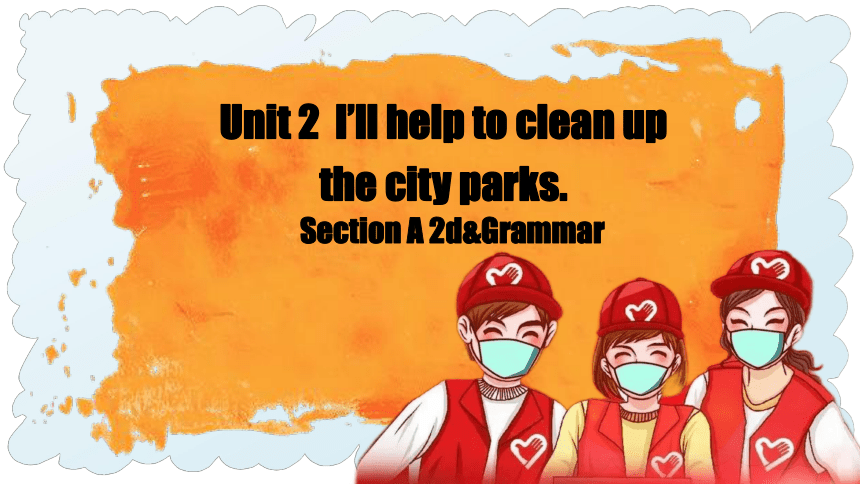 | |
| 格式 | pptx | ||
| 文件大小 | 5.4MB | ||
| 资源类型 | 教案 | ||
| 版本资源 | 人教新目标(Go for it)版 | ||
| 科目 | 英语 | ||
| 更新时间 | 2024-05-14 13:15:01 | ||
图片预览

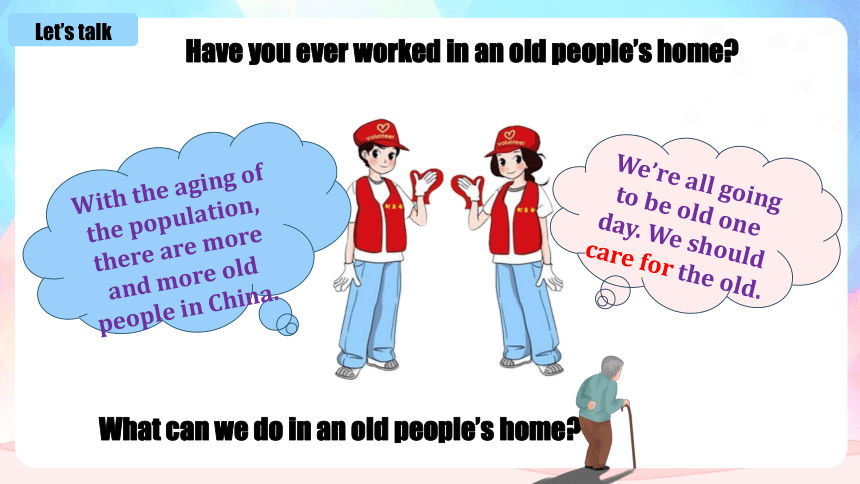
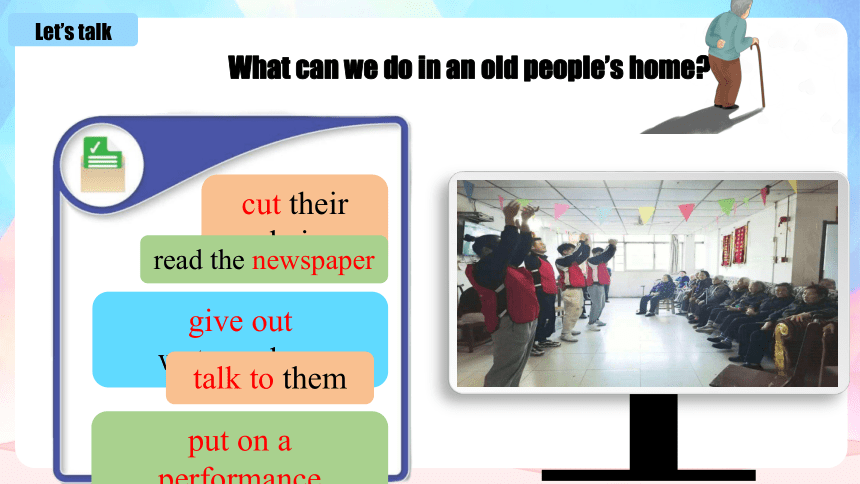
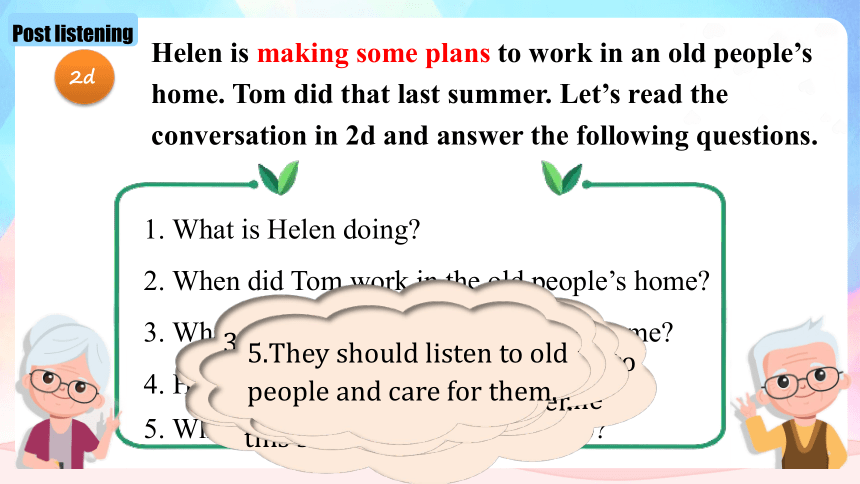
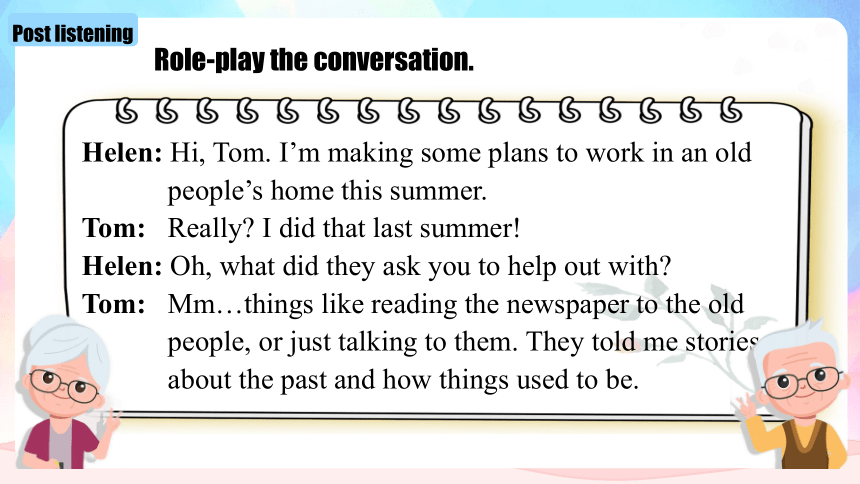
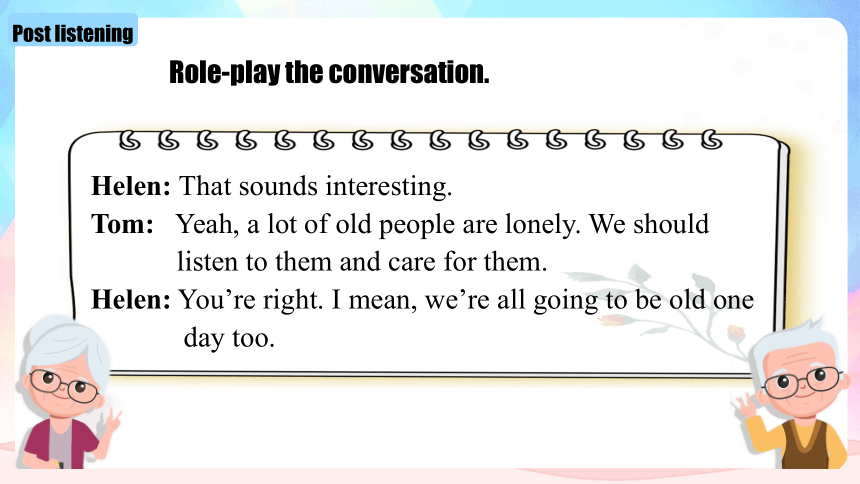
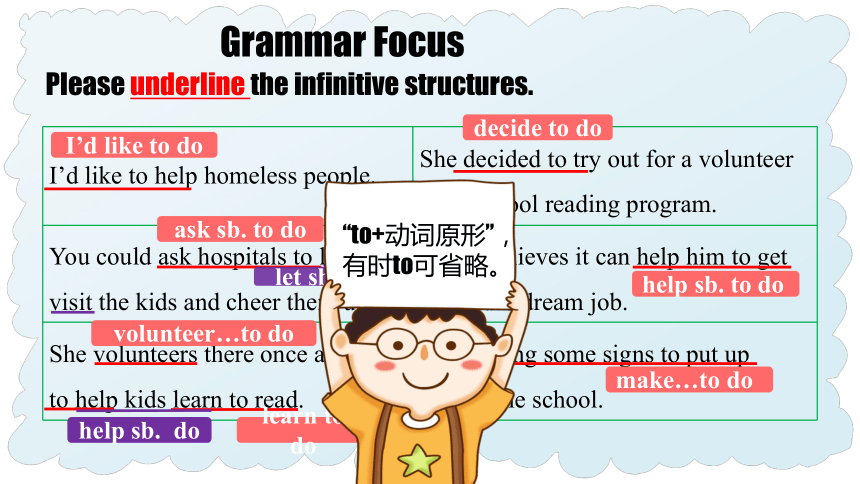
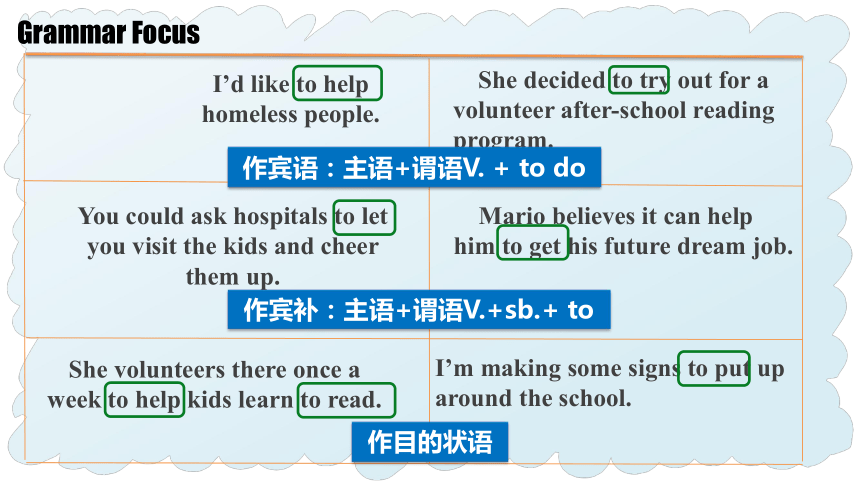
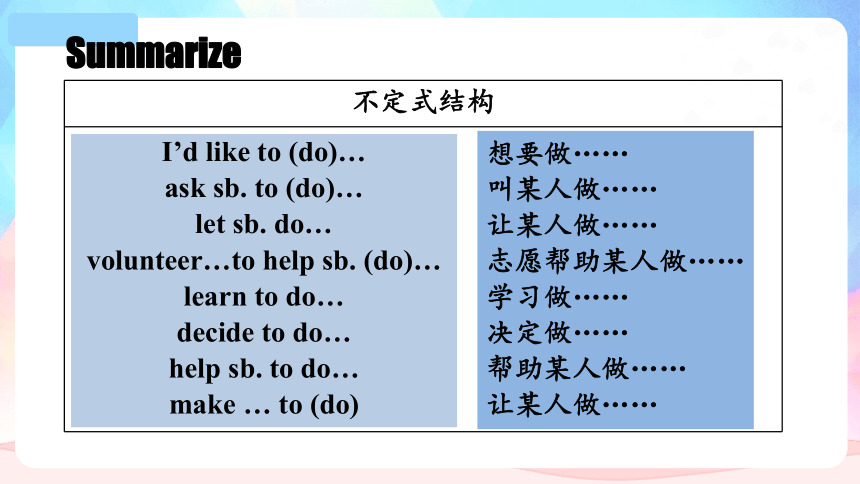
文档简介
(共28张PPT)
Unit 2 I’ll help to clean up
the city parks.
Section A 2d&Grammar
With the aging of the population, there are more and more old people in China.
We’re all going to be old one day. We should care for the old.
Have you ever worked in an old people’s home
Let’s talk
What can we do in an old people’s home
cut their hair
read the newspaper
give out watermelons
talk to them
put on a performance
What can we do in an old people’s home
Let’s talk
1. What is Helen doing
2. When did Tom work in the old people’s home
3. What did Tom do in the old people’s home
4. How do most old people feel
5. What does Tom think they should do
Helen is making some plans to work in an old people’s home. Tom did that last summer. Let’s read the conversation in 2d and answer the following questions.
Post listening
2d
1.Helen is making some plans to
work in an old people’s home
this summer.
2.He worked in the old
people’s home last summer.
3.He read the newspaper and
talked to the old people.
4.They are lonely.
5.They should listen to old
people and care for them.
Role-play the conversation.
Helen: Hi, Tom. I’m making some plans to work in an old
people’s home this summer.
Tom: Really I did that last summer!
Helen: Oh, what did they ask you to help out with
Tom: Mm…things like reading the newspaper to the old
people, or just talking to them. They told me stories
about the past and how things used to be.
Post listening
Role-play the conversation.
Helen: That sounds interesting.
Tom: Yeah, a lot of old people are lonely. We should
listen to them and care for them.
Helen: You’re right. I mean, we’re all going to be old one
day too.
Post listening
Please underline the infinitive structures.
I’d like to help homeless people. She decided to try out for a volunteer after-school reading program.
You could ask hospitals to let you visit the kids and cheer them up. Mario believes it can help him to get his future dream job.
She volunteers there once a week to help kids learn to read. I’m making some signs to put up around the school.
I’d like to do
ask sb. to do
volunteer…to do
learn to do
decide to do
help sb. to do
make…to do
let sb. do
help sb. do
Grammar Focus
“to+动词原形”,
有时to可省略。
I’d like to help homeless people.
She decided to try out for a volunteer after-school reading program.
You could ask hospitals to let you visit the kids and cheer them up.
Mario believes it can help him to get his future dream job.
She volunteers there once a week to help kids learn to read.
I’m making some signs to put up around the school.
动词不定式结构
作宾语:主语+谓语V. + to do
作宾补:主语+谓语V.+sb.+ to
作目的状语
Grammar Focus
Summarize
不定式结构
I’d like to (do)…
ask sb. to (do)…
let sb. do…
volunteer…to help sb. (do)…
learn to do…
decide to do…
help sb. to do…
make … to (do)
想要做……
叫某人做……
让某人做……
志愿帮助某人做……
学习做……
决定做……
帮助某人做……
让某人做……
1. I'd like to help homeless people.
2.She decided to try out for a volunteer after-school reading program.
3.You could ask hospitals to let you visit the kids and cheer them up.
4.Mario believes it can help him to get his future dream job.
5.She volunteers there once a week to help kids learn to read.
6.I'm making some signs to put up around the school.
Grammar Focus
1.我愿意帮助无家可归的人。
2. 她决定参加一个课外阅读项目的志愿者选拔。
3. 你可以请求医院让你看望这些孩子并使他们高兴起来。
4.Mario 相信这能帮助他将来找到理想的工作。
5.她自愿每周在那里工作一次,帮助孩子们学习阅读。
6.我正在制作一些标语,以张贴在学校周围。
Please circle the phrasal verbs.
I’d like to help homeless people. She decided to try out for a volunteer after-school reading program.
You could ask hospitals to let you visit the kids and cheer them up. Mario believes it can help him to get his future dream job.
She volunteers there once a week to help kids learn to read. I’m making some signs to put up around the school.
短语动词
(Phrasal verbs)
Grammar Focus
动词不定式
1. 动词不定式的形式
动词不定式的基本形式是“to+动词原形”,常写作to do(有时to可以省略),否定形式为not to do。
动词不定式没有人称和数的变化。
动词不定式具有名词、形容词和副词的特征,因此可在句中作主语、宾语、宾语补足语、定语和状语等。
2.动词不定式的用法
作主语:一般位于句首,谓语动词用单数。
为了避免句子“头重脚轻”,往往用it代替不定式作形式主语,而将不定式放在后面作真正的主语。
例句:学外语很有用。
It’s very useful to learn foreign languages.
作宾语:主语+谓语V. + to do
不定式常出现在一些及物动词后,构成动词短语。
如:want to do, plan to do, agree to do, learn to do等
另一种是“及物动词+疑问词+带to的不定式”。
例句:他教我如何使用手机。
He taught me how to use mobile phone.
作宾语补足语
常接不定式作宾语补足语的词有tell, ask, want, teach, allow, promise, order, advise, expect, wish, invite, encourage 等。
他们请他在宴会上唱一首流行歌曲。
They asked him to sing a pop song at the party.
作表语
一、主语是不定式(表条件);表语也是不定式(表结果)
例句:工作意味着谋生。
To work means to earn a living.
二、动词不定式做表语常用于以下结构:My job/
dream/goal/aim is…
例句:他的梦想是在不久的将来出国学习。
His aim is to study abroad in the near future.
作定语:不定式作定语应放于被修饰词之后。
例句:我想吃点东西。
I want to have something to eat.
作目的状语
动词不定式可表示某一动作或状态的目的,位于句首或句尾。
例句:她提高了她的声音,以便听得更好。
She raised her voice to be heard better.
他将去车站见他的朋友。
He will go to the station to meet his friends.
在感官动词feel, hear, see, watch, notice, listen to, look at 之后接不带to的动词不定式作宾语补足语。
例句:半小时前我看见她离开了。
I saw her leave half an hour ago.
help后的不定式可省略to,也可以带上to
例句:我哥哥经常帮助我做家务。
My brother often helps me (to) do the housework.
一感(feel)二听(listen to, hear)
三让(let, make, have )四看(look at, see, watch, notice),
半帮助(help)(即在动词 help 后面作宾语补足语时,to可有可无)”。
与特殊疑问词连用:放在what, which, where, when, which, who, how等词之后。
他不知道怎样回答这个问题。
He has no idea of how to answer this question.
还没有决定什么时候举行会议。
When to hold the meeting has not been decided.
Fill in the blanks with the phrasal verbs in the box.
put up
hand out
call up
cheer up
come up with give out put off
1. I want to ______ my plan to work
in an animal hospital until next
summer. I’m too busy with my
studies this year.
put off
2. She hopes to ______ at least five
primary schools to ask if they need
volunteers for their after-school
programs.
call up
4a
3. Our class is trying to ____________
some ideas to _______ sick children
because they are often sad.
4. We decided to ______ signs around
the school and ________ notices to
tell students about the book sale.
We will _______ the money from the
sale to homeless people.
come up with
cheer up
put up
hand out
give out
put up
hand out
call up
cheer up
come up with give out put off
Fill in the blanks with the correct forms of the verbs in the box.
help move do make visit spend
Most people today are only worried about getting good jobs 1.________ lots of money. In their free time, they think about what 2. _______ for fun. However, few people think about what they can do 3. _______ others.
to make
to do
to help
4b
help move do make visit spend
There are many people who are less lucky than us. Volunteering our time to help these people is a good way 4. ________ our free time. For example, we can make plans 5.______ sick children in the hospital or raise money for homeless people. Some people even stop doing their jobs for a few months to a year 6. _______ to another place, like one of the countries in Africa, and help people there.
to spend
to visit
to move
Complete the sentences with your own ideas. Use infinitives.
1. I’d like to volunteer ____________________
______________________________________
2. At 12: a.m., I called my friend ____________
______________________________________
to help kids with their
homework.
to play soccer
together in the afternoon.
4c
3. I’m very busy but I could help ____________
_______________________________________
4. Summer vacation is coming, and I
want __________________________________
5. I want to travel alone. My parents
told me (not) ____________________________
take the trash
out after dinner.
to go camping with my friends.
not to do that.
Unit 2 I’ll help to clean up
the city parks.
Section A 2d&Grammar
With the aging of the population, there are more and more old people in China.
We’re all going to be old one day. We should care for the old.
Have you ever worked in an old people’s home
Let’s talk
What can we do in an old people’s home
cut their hair
read the newspaper
give out watermelons
talk to them
put on a performance
What can we do in an old people’s home
Let’s talk
1. What is Helen doing
2. When did Tom work in the old people’s home
3. What did Tom do in the old people’s home
4. How do most old people feel
5. What does Tom think they should do
Helen is making some plans to work in an old people’s home. Tom did that last summer. Let’s read the conversation in 2d and answer the following questions.
Post listening
2d
1.Helen is making some plans to
work in an old people’s home
this summer.
2.He worked in the old
people’s home last summer.
3.He read the newspaper and
talked to the old people.
4.They are lonely.
5.They should listen to old
people and care for them.
Role-play the conversation.
Helen: Hi, Tom. I’m making some plans to work in an old
people’s home this summer.
Tom: Really I did that last summer!
Helen: Oh, what did they ask you to help out with
Tom: Mm…things like reading the newspaper to the old
people, or just talking to them. They told me stories
about the past and how things used to be.
Post listening
Role-play the conversation.
Helen: That sounds interesting.
Tom: Yeah, a lot of old people are lonely. We should
listen to them and care for them.
Helen: You’re right. I mean, we’re all going to be old one
day too.
Post listening
Please underline the infinitive structures.
I’d like to help homeless people. She decided to try out for a volunteer after-school reading program.
You could ask hospitals to let you visit the kids and cheer them up. Mario believes it can help him to get his future dream job.
She volunteers there once a week to help kids learn to read. I’m making some signs to put up around the school.
I’d like to do
ask sb. to do
volunteer…to do
learn to do
decide to do
help sb. to do
make…to do
let sb. do
help sb. do
Grammar Focus
“to+动词原形”,
有时to可省略。
I’d like to help homeless people.
She decided to try out for a volunteer after-school reading program.
You could ask hospitals to let you visit the kids and cheer them up.
Mario believes it can help him to get his future dream job.
She volunteers there once a week to help kids learn to read.
I’m making some signs to put up around the school.
动词不定式结构
作宾语:主语+谓语V. + to do
作宾补:主语+谓语V.+sb.+ to
作目的状语
Grammar Focus
Summarize
不定式结构
I’d like to (do)…
ask sb. to (do)…
let sb. do…
volunteer…to help sb. (do)…
learn to do…
decide to do…
help sb. to do…
make … to (do)
想要做……
叫某人做……
让某人做……
志愿帮助某人做……
学习做……
决定做……
帮助某人做……
让某人做……
1. I'd like to help homeless people.
2.She decided to try out for a volunteer after-school reading program.
3.You could ask hospitals to let you visit the kids and cheer them up.
4.Mario believes it can help him to get his future dream job.
5.She volunteers there once a week to help kids learn to read.
6.I'm making some signs to put up around the school.
Grammar Focus
1.我愿意帮助无家可归的人。
2. 她决定参加一个课外阅读项目的志愿者选拔。
3. 你可以请求医院让你看望这些孩子并使他们高兴起来。
4.Mario 相信这能帮助他将来找到理想的工作。
5.她自愿每周在那里工作一次,帮助孩子们学习阅读。
6.我正在制作一些标语,以张贴在学校周围。
Please circle the phrasal verbs.
I’d like to help homeless people. She decided to try out for a volunteer after-school reading program.
You could ask hospitals to let you visit the kids and cheer them up. Mario believes it can help him to get his future dream job.
She volunteers there once a week to help kids learn to read. I’m making some signs to put up around the school.
短语动词
(Phrasal verbs)
Grammar Focus
动词不定式
1. 动词不定式的形式
动词不定式的基本形式是“to+动词原形”,常写作to do(有时to可以省略),否定形式为not to do。
动词不定式没有人称和数的变化。
动词不定式具有名词、形容词和副词的特征,因此可在句中作主语、宾语、宾语补足语、定语和状语等。
2.动词不定式的用法
作主语:一般位于句首,谓语动词用单数。
为了避免句子“头重脚轻”,往往用it代替不定式作形式主语,而将不定式放在后面作真正的主语。
例句:学外语很有用。
It’s very useful to learn foreign languages.
作宾语:主语+谓语V. + to do
不定式常出现在一些及物动词后,构成动词短语。
如:want to do, plan to do, agree to do, learn to do等
另一种是“及物动词+疑问词+带to的不定式”。
例句:他教我如何使用手机。
He taught me how to use mobile phone.
作宾语补足语
常接不定式作宾语补足语的词有tell, ask, want, teach, allow, promise, order, advise, expect, wish, invite, encourage 等。
他们请他在宴会上唱一首流行歌曲。
They asked him to sing a pop song at the party.
作表语
一、主语是不定式(表条件);表语也是不定式(表结果)
例句:工作意味着谋生。
To work means to earn a living.
二、动词不定式做表语常用于以下结构:My job/
dream/goal/aim is…
例句:他的梦想是在不久的将来出国学习。
His aim is to study abroad in the near future.
作定语:不定式作定语应放于被修饰词之后。
例句:我想吃点东西。
I want to have something to eat.
作目的状语
动词不定式可表示某一动作或状态的目的,位于句首或句尾。
例句:她提高了她的声音,以便听得更好。
She raised her voice to be heard better.
他将去车站见他的朋友。
He will go to the station to meet his friends.
在感官动词feel, hear, see, watch, notice, listen to, look at 之后接不带to的动词不定式作宾语补足语。
例句:半小时前我看见她离开了。
I saw her leave half an hour ago.
help后的不定式可省略to,也可以带上to
例句:我哥哥经常帮助我做家务。
My brother often helps me (to) do the housework.
一感(feel)二听(listen to, hear)
三让(let, make, have )四看(look at, see, watch, notice),
半帮助(help)(即在动词 help 后面作宾语补足语时,to可有可无)”。
与特殊疑问词连用:放在what, which, where, when, which, who, how等词之后。
他不知道怎样回答这个问题。
He has no idea of how to answer this question.
还没有决定什么时候举行会议。
When to hold the meeting has not been decided.
Fill in the blanks with the phrasal verbs in the box.
put up
hand out
call up
cheer up
come up with give out put off
1. I want to ______ my plan to work
in an animal hospital until next
summer. I’m too busy with my
studies this year.
put off
2. She hopes to ______ at least five
primary schools to ask if they need
volunteers for their after-school
programs.
call up
4a
3. Our class is trying to ____________
some ideas to _______ sick children
because they are often sad.
4. We decided to ______ signs around
the school and ________ notices to
tell students about the book sale.
We will _______ the money from the
sale to homeless people.
come up with
cheer up
put up
hand out
give out
put up
hand out
call up
cheer up
come up with give out put off
Fill in the blanks with the correct forms of the verbs in the box.
help move do make visit spend
Most people today are only worried about getting good jobs 1.________ lots of money. In their free time, they think about what 2. _______ for fun. However, few people think about what they can do 3. _______ others.
to make
to do
to help
4b
help move do make visit spend
There are many people who are less lucky than us. Volunteering our time to help these people is a good way 4. ________ our free time. For example, we can make plans 5.______ sick children in the hospital or raise money for homeless people. Some people even stop doing their jobs for a few months to a year 6. _______ to another place, like one of the countries in Africa, and help people there.
to spend
to visit
to move
Complete the sentences with your own ideas. Use infinitives.
1. I’d like to volunteer ____________________
______________________________________
2. At 12: a.m., I called my friend ____________
______________________________________
to help kids with their
homework.
to play soccer
together in the afternoon.
4c
3. I’m very busy but I could help ____________
_______________________________________
4. Summer vacation is coming, and I
want __________________________________
5. I want to travel alone. My parents
told me (not) ____________________________
take the trash
out after dinner.
to go camping with my friends.
not to do that.
同课章节目录
- Unit 1 What's the matter?
- Section A
- Section B
- Unit 2 I'll help to clean up the city parks.
- Section A
- Section B
- Unit 3 Could you please clean your room?
- Section A
- Section B
- Unit 4 Why don't you talk to your parents?
- Section A
- Section B
- Unit 5 What were you doing when the rainstorm came
- Section A
- Section B
- Review of Units 1-5
- Unit 6 An old man tried to move the mountains.
- Section A
- Section B
- Unit 7 What's the highest mountain in the world?
- Section A
- Section B
- Unit 8 Have you read Treasure Island yet?
- Section A
- Section B
- Unit 9 Have you ever been to a museum?
- Section A
- Section B
- Unit 10 I've had this bike for three years.
- Section A
- Section B
